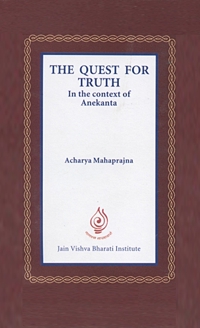
Jain philosophy does not give the rule for social organization nor does it give the direction for desire and acquisition of wealth. It does not give a vision for a life as a whole and that is why it is incomplete. This argument has been established and yet is not beyond contention. In Jain philosophy the discussion about moksha dominates (moksha dharma). The main objective of a philosophy of moksha is to discuss dharma.
In this context, even the meaning of dharma changes.
- In the context of attachment and wealth, dharma acquires the meaning of being that, which controls the working of social organization.
- In the context of moksha it acquires the meaning of correcting or purifying the consciousness.
All the directions that Mahavira gave are for the purification of the soul. These directions influenced wealth and attachment. But it cannot be said that Mahavira gave instructions in this direction.
Can a philosophy of moksha, however, do so?
It is not always possible to separate violence and possessiveness from social organization.
The fundamental of moksha-dharma is non-violence and non-possessiveness.
So social organization and moksha-dharma cannot be given the same base.
Moksha-dharma advises social organization to reduce violence and possessiveness. It favours socialism. And, therefore, at this point there is a possible meeting of the two. But there is no fundamental commonness between the two. Individualistic social organization was based on the self and so there was no limit, in that thinking, to the accumulation of wealth. In addition to individual freedom, there was freedom for cruelty too. In socialist societies, the means of production are socially owned and so the society had control over wealth. In such a situation, individual freedom is hurt. The social organization influenced by moksha-dharma is thus also deeply influenced by compassion. In this situation, both individual freedom and control over accumulation are affected. But for this it is very important to direct oneself to improve and refine the quality of social character.
Is it possible to establish a relationship between social organization and moksha-dharma with Anekanta?
Can a unity between violence and non-violence, possessiveness and non-possessiveness not be established?
The advocates of Anekanta explained opposites in terms of unity and, therefore, this question is natural.
By ignoring this truth we cannot understand the anekantic view which says that the very attribute, the need of which we are feeling ourselves, we are attaching ourselves to.
In an object, contradictory attributes of permanence and impermanence lose their contradiction.
But with respect to the attribute to which the object is permanent, it is not impermanent with respect to the same attribute.
Similarly, with respect to the attribute to which it is impermanent it is also not permanent.
And yet, permanence and impermanence both exist in unity in an object.
That is why an object is both permanent and impermanent and its holistic description can be made in relative terms.
In a social organization violence and non-violence, possessiveness and non-possessiveness exist in unity.
Through anekanta it is not possible to establish oneness between social organization and moksha dharma.
It is not possible to define the unity between violence and non-violence or possessiveness and non-possessiveness.
But in the context of social organization it is possible to describe their existence.
Violence and possessiveness cannot be separated from a social organization just because one cannot equate social organization to moksha-dharma.
But in the fact that in a social organization violence and possessiveness can be minimized, one can see unity in social organization and moksha-dharma.
 Acharya Mahaprajna
Acharya Mahaprajna


